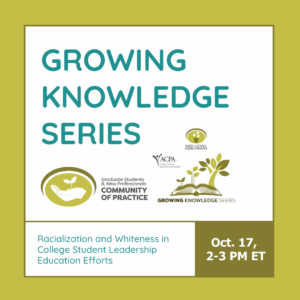Events

- This event has passed.
Growing Knowelege Series Webinar: Racialization and Whiteness in College Student Leadership Education Efforts
October 17, 2024 @ 2:00 pm - 3:00 pm UTC+0
The Growing Knowledge Series (GKS) creates a pathway for those who have completed their dissertation, but never published, to share their scholarship with the profession through a hosted webinar. This collaborative effort of our three Communities of Practice is positioned to benefit practitioners and scholars alike, creating a space to share new knowledge frequently left on the shelf. Join Dr. Lauren N. Irwin, an assistant professor of Educational Leadership and Policy Studies at the University of Tennessee, Knoxville, as she presents two research studies that aim to better understand how racial meanings, or racialization, shape college student leadership education efforts.
Research Summary:
Dissertation Title: Racialization and Whiteness in College Student Leadership Education Efforts
Brief Summary: This dissertation comprises two studies that aim to better understand how racial meanings, or racialization, shape college student leadership education efforts. Colleges shape—and are shaped by—dominant beliefs about race and leadership. Colleges have a longstanding commitment to student leadership development. As such, many colleges rely on leadership education programs (LEPs) to develop students’ leadership abilities.
Research asserts that colleges allocate resources based on their priorities. However, there is little scholarship about how LEPs are resourced and how campus priorities shape LEPs’ resources. Further, scholars have critiqued leadership education’s failure to disrupt racism and whiteness. The frameworks scholars have developed to foster diversity, equity, inclusion, and social justice (DEISJ) in LEP practice neglect organizational considerations in favor of individual and local practices.
These studies investigate how different campuses racialize LEPs and their resources. The first study examined how LEPs replicate and/or resist whiteness. Findings demonstrated that LEPs’ integration of DEISJ varied, despite DEISJ commitments across campuses. These varied commitments stemmed from leadership educators’ beliefs about whiteness, social justice, and leadership. Organizational and individual beliefs about leadership and LEP practice shaped how whiteness manifested across LEPs. The second study examined how campus resource allocation shaped LEP practice and considered how access to resources was racialized. Findings demonstrated that DEISJ was a stated priority across campuses while leadership was not. Further, colleges often allocated resources in ways that deviated from their stated DEISJ commitments and furthered inequities.
This scholarship extends research and practice in several ways. To date, no studies have used Ray’s (2019) theory of racialized organizations to study student affairs contexts or LEPs. Further, this dissertation addressed a lack of empirical studies of DEISJ efforts in student affairs LEPs. Disproportionately, the critical and social justice-oriented leadership education scholarship is conceptual and aspirational, draws on authors’ experiences at single institutions, and has primarily centered academic leadership education contexts. In short, there is a lack of knowledge about how leadership educators in diverse campus and LEP contexts replicate and/or reinforce whiteness. Thus, findings offer vital insights into practice to lift up transformative possibilities.
Registration Fees:
Complimentary for ACPA Individual Members
$10 for ACPA Chapter Only Members
$10 for Non-Members

